OPERATION PANGOLIN (PART ONE)
The Sting: Meet the men and women risking their lives to save pangolin from being trafficked through a global criminal network
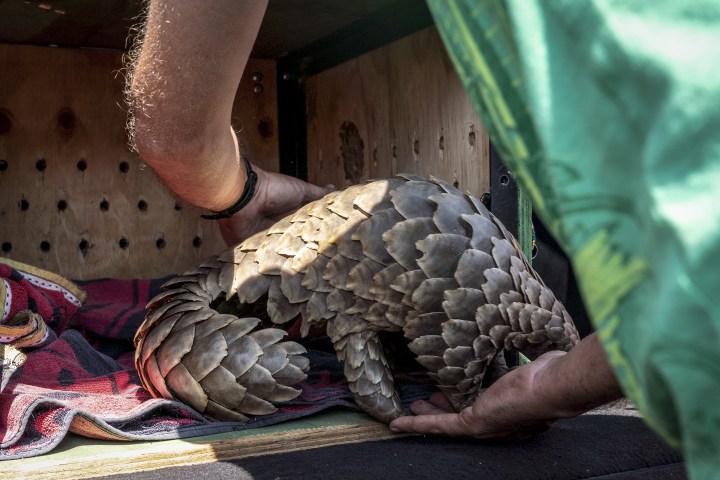
Over the past few months, Daily Maverick has documented the war on pangolin poaching and the conservation of what has become the most trafficked mammal in the world. In the first of this two-part series, we follow undercover agent Professor Ray Jansen and a group of brave men and women who are on a mission to save these creatures.
‘OK, I see the second one now. Got you. My rearview mirror is on them … I see them perfectly…
“Get ready,” the operative says. “Get ready.”
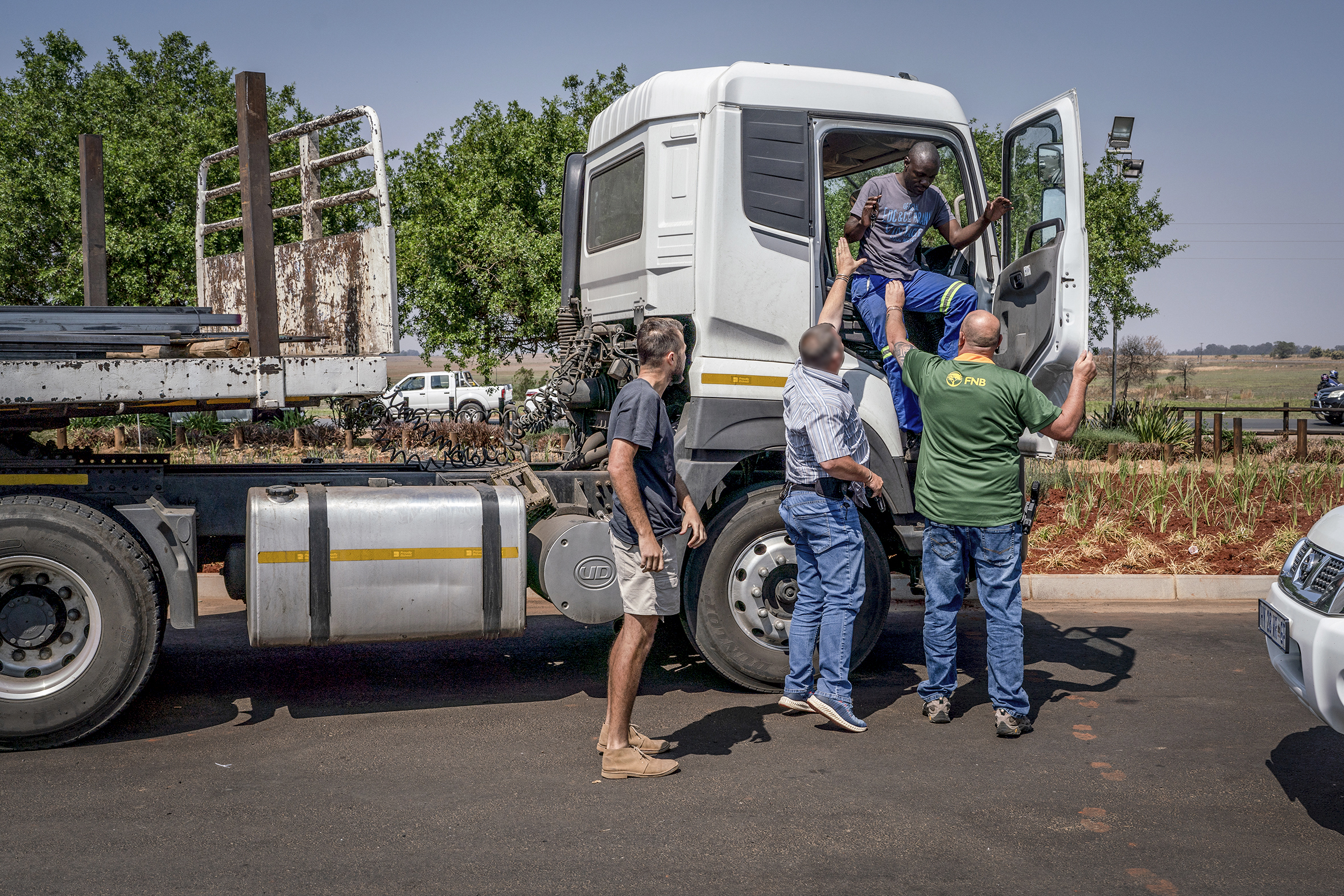
Law enforcement officials pull a driver from the cab of his truck in a sting operation. (Photo: Shiraaz Mohamed)
Moments later, he bursts out of the door of his vehicle parked metres away from where the transaction is taking place. With lightning speed, Professor Ray Jansen sprints towards two suspects. The signal for the takedown has been given. The sound of police sirens reverberates through the air followed by screeching tyres as more officials move in.
Jansen is a pangolin expert who has dedicated his life to this mammal’s conservation, and who through a Section 252a authority – a court endorsement to stage stings and entrapment operations – works as an undercover agent for the state posing as a pangolin buyer.
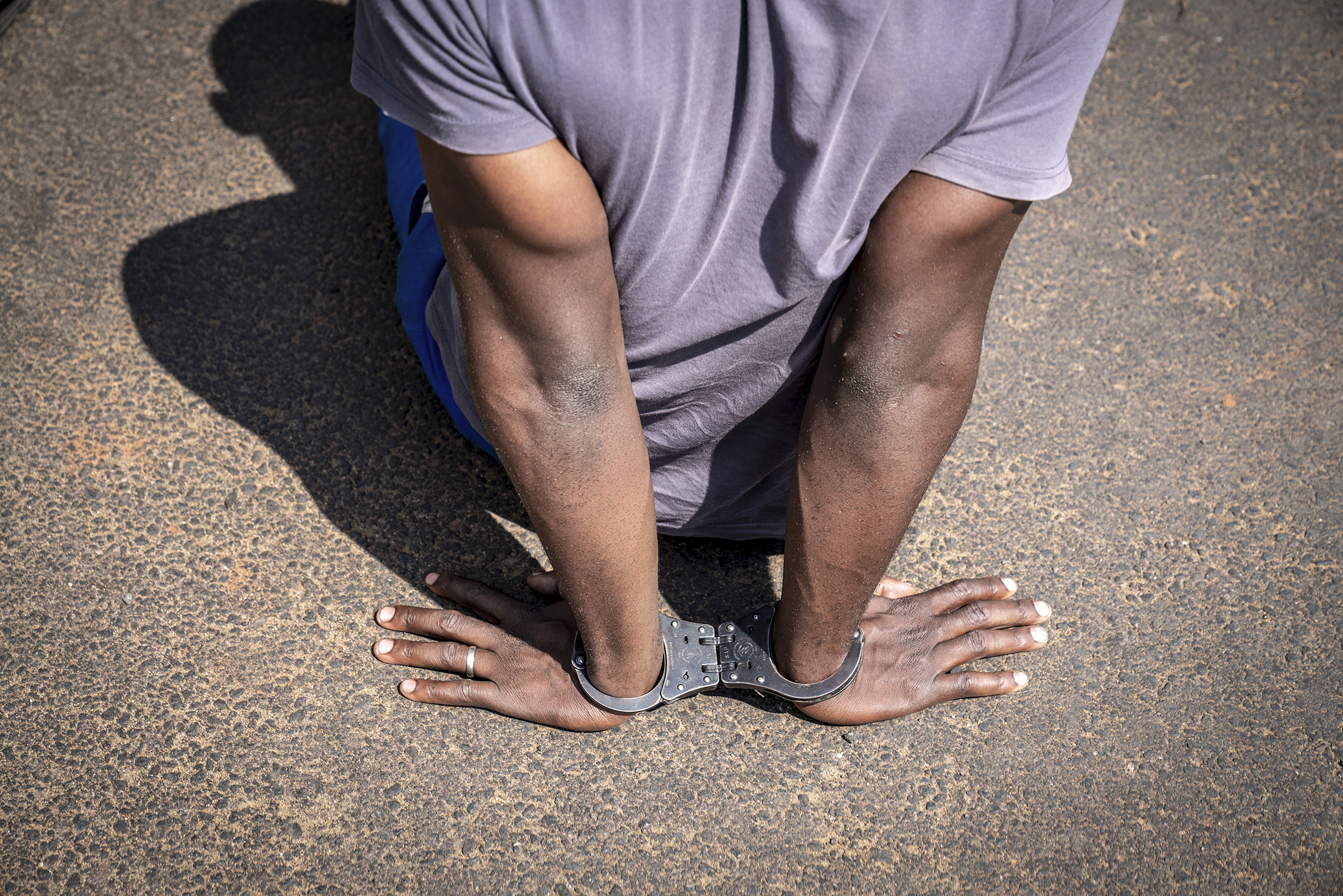
A truck driver from Zimbabwe is arrested in a sting after trying to sell a pangolin. (Photo: Shiraaz Mohamed)
For months Daily Maverick has shadowed him as he and other brave men and women tracked syndicates, staged buys and conducted sting operations to arrest the people trafficking pangolin from Africa to Asia.
“It’s a lot of these people that we catch on the ground. The same people that are involved in smuggling drugs such as Mandrax, heroin and cocaine are also heavily involved in wildlife trafficking, trafficking in rhino horn, elephant ivory, pangolin scales and abalone (commonly known as perlemoen). And I’ve seen more and more of this in recent years, where syndicates are involved, and they often offer me elephant ivory, rhino horn and blood diamonds in the same transaction, as they would with pangolins,” Jansen says.
Back at the scene of the takedown, the first suspect is pinned down by two officers. The second tries to flee and puts up a fight. It takes six guys to pin him down. They don’t take any chances, so his legs and hands are tied with thick, blue cable ties.
In the back of the Nissan NP200 bakkie, Jansen inspects the pangolin kept in a cardboard box. “I’m shaking too much, it’s all blurred.” He says as he climbs out, indicating that he needs help to remove the pangolin. An Environmental Management Inspector from Gauteng, from a unit commonly referred to as the Green Scorpions, clambers into the rear of the vehicle to take photographs and retrieve the pangolin.
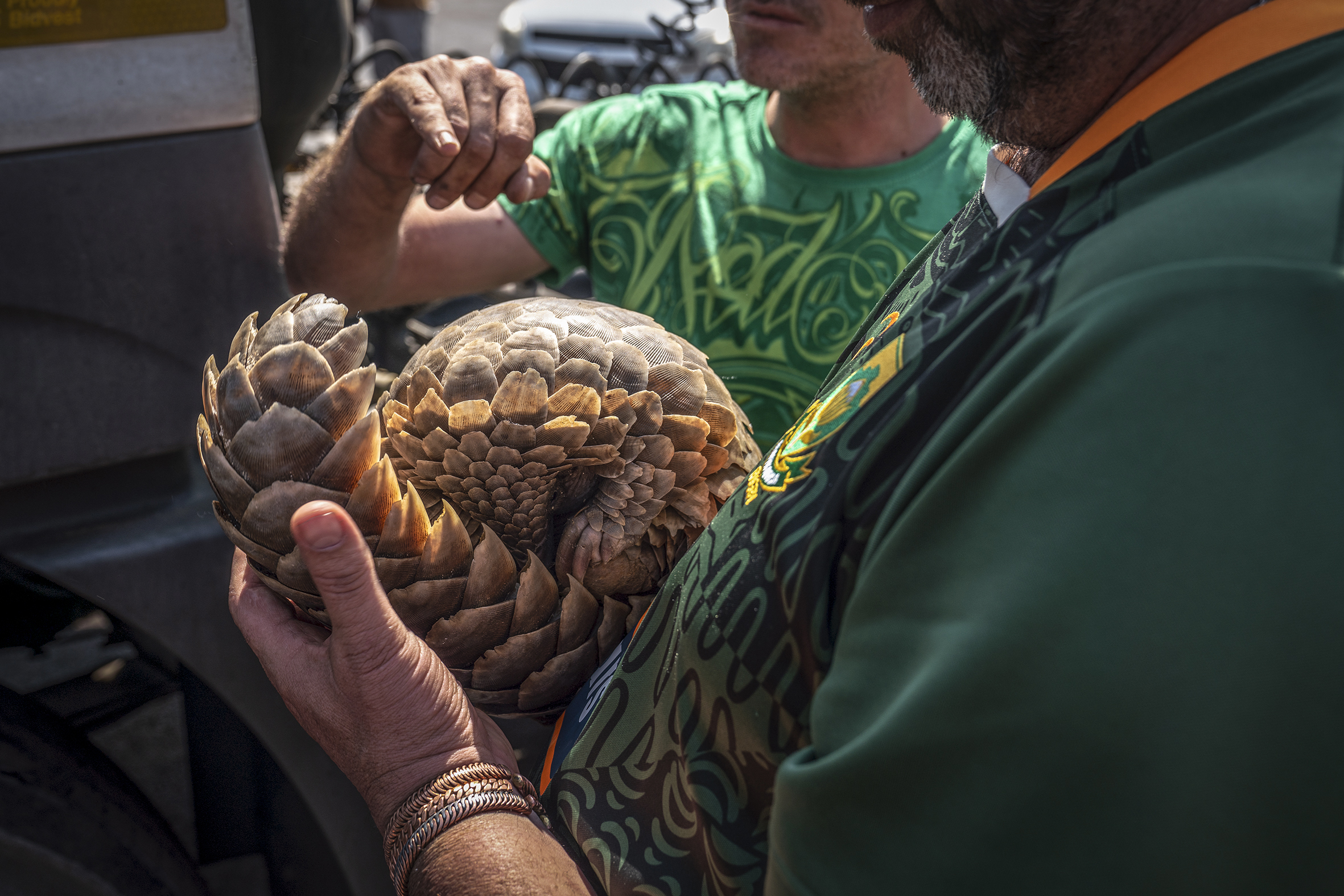
Officials examine a pangolin rescued in a sting operation. (Photo: Shiraaz Mohamed)
Outside, the first suspect is protesting his innocence, “Brothers forgive me, I did not know this, Bozza [boss]. I don’t resist, neh. I am really cooperative. Please forgive me. I am really cooperative with you, brothers.”
Jansen rests his hands on the man’s shoulders and as if comforting him says, “It’s all right, bru; it’s all right, man.”
“I am trying to save them (the pangolin). I want to leave them in the wild; they are very endangered. They are going to all die, so I have to try and save them,” Jansen tells the man, who is now offering to take him to Kuruman where more pangolins are allegedly being moved.
The man’s pleas go unheard and he and his accomplice are taken to a nearby police station where they are charged with wildlife trafficking and contravening the National Environmental Management Biodiversity Act.
A large group of people has gathered, curious to know what has happened. Jansen calls them closer and explains the significance of the pangolin and its cultural values. He tells them they are endangered and explains why the suspects were arrested. They are allowed to take photographs of the pangolin and are encouraged to go back to their communities and spread the word to create awareness.
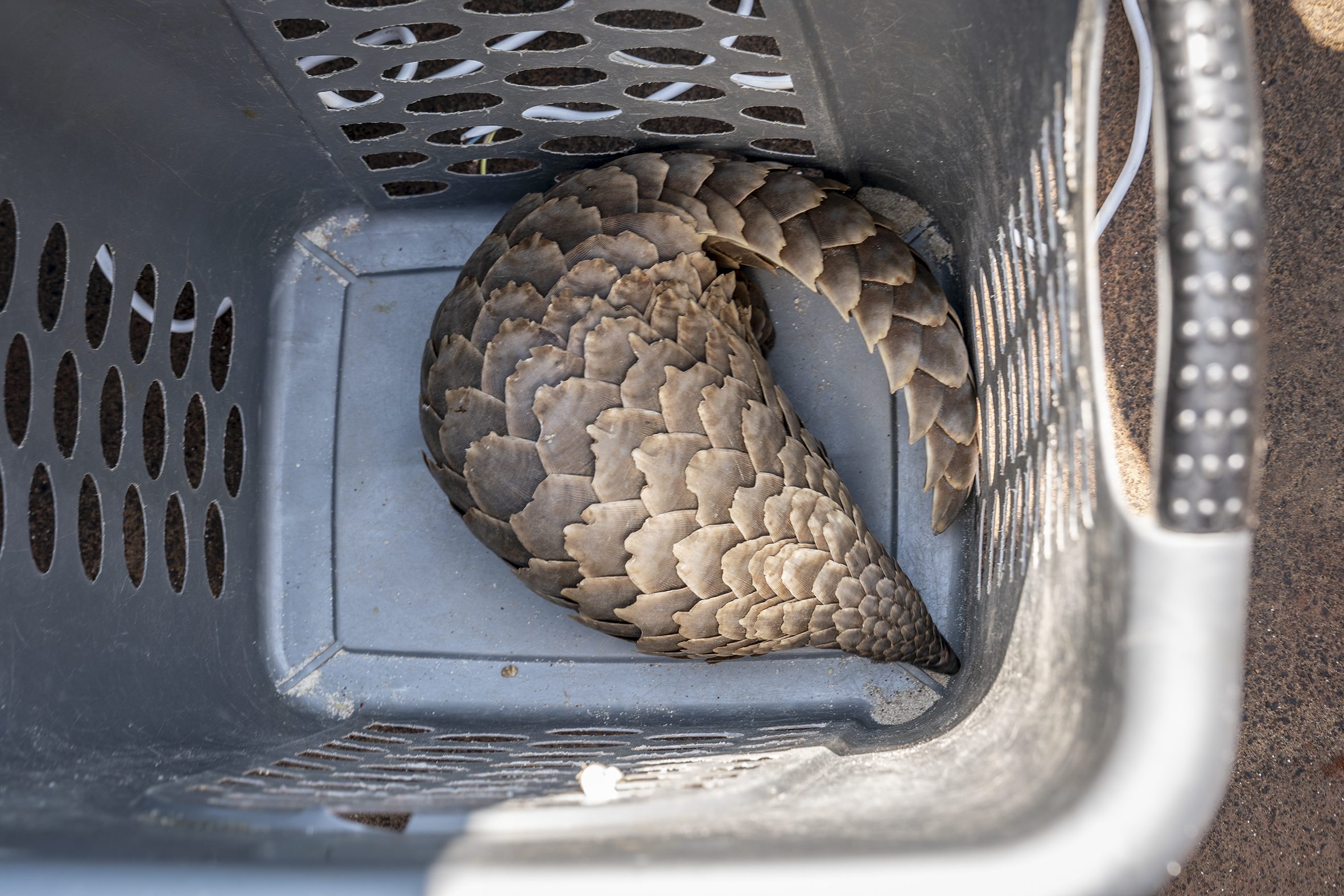
A pangolin kept in a washing basket is rescued in a sting operation. (Photo: Shiraaz Mohamed)
Inside the box, the pangolin shows no visible signs of distress, but it later dies of organ failure at the Johannesburg Wildlife Veterinary Hospital where it is taken for treatment.
Medicinal value
For thousands of years, people have used natural products for their medicinal value. The practice of using plant and animal-based products continues today. In the Far East, pangolins are at the top of the list. More than 60 products contain pangolin scales, either dried or crushed into a powder and made into tablets, creating a huge market for their scales.
The same substance that makes up fingernails, hair and horn also makes up pangolin scales: keratin. While pangolin scales and rhino horn have no proven medical benefits, traditional Chinese medicine uses them to treat conditions ranging from arthritis to breastfeeding problems.
In Asia, particularly in countries such as Vietnam, pangolin meat is considered a delicacy.

A file photo showing soldiers on patrol close to the Beit Bridge Border. Despite the presence of law enforcement officials, a large number of pangolin are smuggled into South Africa from Zimbabwe. (Photo: Shiraaz Mohamed)
In South Africa, some local customs claim pangolins can guard against evil, bring good luck and be used as love charms. The sought-after body parts include the scales, blood, meat, bones, claws and skin. It is claimed, though not scientifically proven, that pangolin parts can cure nose bleeds, high blood pressure, ear aches, diabetes, HIV/Aids, sexually transmitted diseases, rheumatism, chest pains, back pains and liver cancer.
In West Africa, some people believe the pangolin cures and treats financial difficulties, mental illness, miscarriage, menstrual pain and infertility and offers protection against witchcraft.
Catching poachers
Mike* (*not his real name) is an undercover agent based in Limpopo. He works closely with Jansen, the conservationist group Transfrontier Africa, the police, the Limpopo Endangered Species Unit, local anti-poaching teams as well as local community policing forums.
Despite many pangolins being harvested within South Africa, most of those that Mike and his team intercept are smuggled into South Africa from Zimbabwe. The pangolins are sourced by a local, who then reaches out to someone in the trade, and the word is put out that pangolins are on the market.

A file photo showing a truck entering South Africa from Zimbabwe. A large number of pangolins rescued from the trade originate from Zimbabwe. (Photo: Shiraaz Mohamed)
Often multiple groups are linked to a central figure who will try to sell the same pangolin, Mike explains.
“The arrests are normally always big. They’re always four or five people because that is the grouping, and that grouping will have friends with other people. We’ve managed to take down three different groups, all connected via the same individual, who sits in Zimbabwe. He sends the pangolins to his different connections in South Africa and he controls it.
“We’ve followed him on WhatsApp, because he uses his status as a marketplace. He’s put cellphones, laptops, TVs, all sorts of things for sale on it. And he puts pangolins on it as well for a short time, but he puts them through and then generally you find it filtering through the market, where you’ll find the same pangolin coming from four or five different groups, different angles, etc, all with different pricing.”
In a recent bust, Mike and his team intercepted a deal that was being facilitated from KwaZulu-Natal. The seller travelled to Johannesburg to collect a pangolin smuggled from Zimbabwe and made his way to Limpopo where he tried to sell the pangolin, before he was arrested.
Trade routes
For many years, poachers and traffickers focused mostly on Asian species. However, since their numbers have dwindled, traffickers have turned to African pangolins. According to Mike, corrupt officials – including police and SARS customs officials – all play a part in the illegal trade.
Jansen says middlemen working for syndicates collect the pangolins after they have been harvested. They are collected either alive or their scales are collected. Very rarely are individual mammals involved.
The “cargo” is moved from South Africa to a port in another country such as Maputo in Mozambique, where customs duties and the policing system are often more lax than at South African harbours. Using incorrect labels, the cargo is loaded on to shipping containers and smuggled to ports in Malaysia, Vietnam and Hong Kong.

A tag as seen on a rescued pangolin. Tags aid in recording the movement of these animals. (Photo: Shiraaz Mohamed)
The shipment is then sold to a manufacturing company which processes the scales into a powder and eventually into various forms of medicines. According to the investigators, up to six or seven transactions take place, from the time the mammal is harvested in Africa until it reaches Asia.
“Each time this transaction takes place, the value of the animal increases. And then the end value is what [makes] it this perceived very, very expensive commodity. And that’s the word on the ground. It’s not always the end value that is collected on the ground. It’s a hell of a lot less. But that’s where the negotiation starts because each person in this commodity chain wants to make money. So what he pays for it or she pays for it, they want to sell it at an advanced value,” Jansen explains.
According to the African Wildlife Foundation, pangolin prices are on the rise, fetching $600 a kilogram today compared to $14 a kilogram in the 1990s.
Continental drift
Nigeria is considered to be the epicentre of the pangolin crisis. According to reports, criminal networks in Nigeria have secured the majority of the African pangolin trade as a result of the country’s porous borders, its low level of law enforcement, corruption, and because it has one of the largest ports on the continent, Lagos.
The Environmental Investigation Agency reports that, between 2015 and 2021, 167 tons of pangolin parts (equivalent to 167,000 pangolins) originating from Nigeria were seized worldwide.
“We keep a record of what we hear about that’s intercepted. So if there’s been 5kg or 10kg, we probably won’t hear about it.
“But those big hauls of 250kg or a ton of scales, are the ones we hear about, but the large majority we do not hear about. So if you’re talking about that level of trade of pangolin scales going to Asia, for a mammal that only has one pup every year or possibly only every second year, the off-take far exceeds the pace of natural reproduction for the species. That basically means the population is in a major negative decline,” says Jansen, who estimates that the animals may be extinct in the next 20 years.
Scales of injustice
Although it’s not as prevalent as in West Africa, South African government officials have also been caught with their hands in the honey jar. According to Jansen, during five separate busts, policemen have been arrested. “On one occasion, just south of Polokwane, a Deputy Director of Agriculture for Limpopo was arrested. That trial is still pending.”
In 2019, Zwiitwaho Ian Maphiri, employed by the Limpopo Department of Agriculture and Rural Development as its Deputy Director of Corporate Communications, was found in possession of a pangolin in the boot of his BMW. The case is still ongoing, and a reliable source told Daily Maverick the docket had to be moved to a secure location as there were attempts to make the docket “disappear”.
Visit Daily Maverick’s home page for more news, analysis and investigations
Sting operations are ongoing, not only with Jansen and his team, but also with various law enforcement units. Earlier this year, Lieutenant-Colonel RR Ryland and his team of the Johannesburg police’s tactical response Team, working on intelligence from Crime Intelligence, swooped on three suspects in Cosmos City, rescuing two pangolins, which were handed over to the Johannesburg Wildlife Veterinary Hospital for treatment.

Col RR Ryland (right) and his team after the arrest of three suspects in Cosmos City, Johannesburg. Two pangolins were recovered during their operation. (Photo: Shiraaz Mohamed)
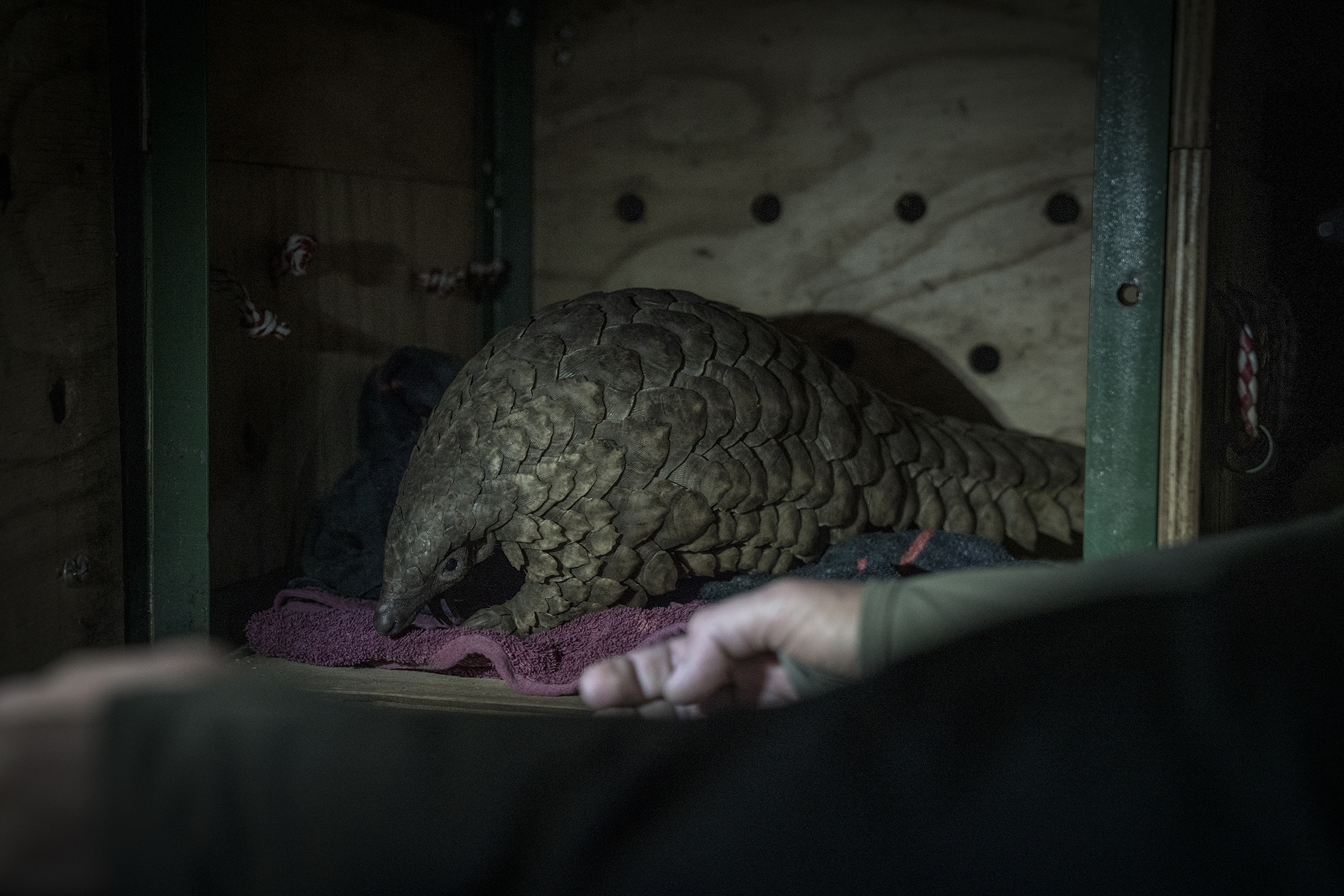
A rescued pangolin about to be transported to the Johannesburg Wildlife Veterinary Hospital after members of the Johannesburg Tactical Response Team and Criminal Intelligence units received information about suspected poachers in Cosmos City, Johannesburg. Three suspects were arrested. (Photo: Shiraaz Mohamed)
Since 2015, 156 criminal cases involving the illegal pangolin trade have been opened in South Africa, most in Gauteng and Limpopo. Only half of these cases have been finalised and to date the harshest sentence handed down is 10 years in a Pretoria court. Previously, sentences handed down were in the form of a fine, usually between R500 and R1,000.
Traditional Chinese Medicine (TCM) list
Despite conservationists around the world breathing a sigh of relief in 2020 when pangolin scales were removed from the list of Chinese traditional medicines, the illegal trade continues to flourish.
Jansen explains that the ban only applies to non-patented products. “Now, there’s the loophole, if your product is patented, and ingredients form part of that patent they are exempt from that rule. So what happens? You just start patenting more products.”
He says another loophole allows existing stockpiles to be exempt.
Read Part Two: Back to the wild: The painstaking, often heartbreaking process of returning poached pangolins to their natural habitat
But Jansen asks, “How do you know when (a stockpile) is going to be depleted? How do you know that you’re not adding fresh pangolin continuously to the stockpile? It’s not being monitored … The market is booming, you just don’t declare it. It’s all underground. Everything is now underground.”
According to industry information publisher IBISWorld, the TCM-manufacturing industry in China has grown 4.1% on average between 2017 and 2022 and is worth $47.4-billion.
Jansen believes pangolins were possibly removed from the list of animals granted use in traditional medicine because of the embarrassment from the SARS Covid-19 outbreak, which was thought to have possibly originated from an Asian species of pangolin sold in a wet market in Wuhan, China.
Death threats
Jansen has been living a covert life for the past few years, much to the anguish of his family. Despite receiving death threats, he has continued in his fight to save the pangolin.
A former specialist infantry soldier in the South African border war, he has seen combat and describes each night before a sting operation as similar to preparing for a battle.
“There is nausea, you don’t sleep. It’s like going into combat. It’s exactly the same thing. These are the emotions that you have to deal with. Your adrenaline and certain feelings of PTSD come about…
“Each operation I’m on, I still remember them vividly. Every single one, I can smell it, I can taste it, I can still be there. And there comes a point that you can’t anymore. It’s just, it’s all too much and that’s when you have to do something else, or else you’re going to lose it,” Jansen says, describing his mental state after years of acting as an agent. He now feels that the time has come for him to retire.
“It does become more dangerous for me and my family. The police have to take over and they have to do what they’re good at. It becomes more difficult for a member of the public to be involved in this, we can call it a war, which is a problem,” he says. DM/OBP



















 Become an Insider
Become an Insider
Why is it that whenever something underhanded appears in the news, the names of two specific non-African countries always seem to pop up?
These stories just break my heart, we are indeed a country that has failed the planet in every respect.